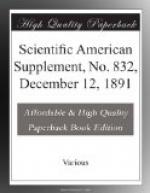“without reproach
The grand old name of gentleman,”
and that his mellow old age is the ripening into fruit of “the white flower of a blameless life.”—Chicago Graphic.
* * * * *
FIFTIETH YEAR OF THE PRINCE OF WALES.
In the case of a distinguished person whose public life has a claim to be regarded with national and social interest, his fiftieth birthday must be considered a jubilee; and Monday, Nov. 9, in the present year, completing that number of anniversaries for the eldest son of her Majesty the Queen, the heir apparent to the crown of the United Kingdom, is manifestly an occasion demanding such congratulations as must arise from sentiments of loyalty to the monarchical constitution and of respect for the reigning family. His Royal Highness, it is understood, has preferred to have it treated simply as a private and domestic affair, entertaining a party of his personal friends, and not inviting any formal addresses from the representatives of municipal corporations or other public bodies. Nevertheless, it may be permitted to journalists, taking note of this period in the life of so important a contemporary personage, to express their continued good wishes for his health and happiness, and to indulge in a few retrospective observations on his past career.
Born on Nov. 9, 1841, second of the offspring of Queen Victoria by her marriage with the late Prince Consort, Albert Edward, Prince of Wales, inherited the greatest blessing of humanity, that of having good parents and wise guardians of his childhood and youth. His instruction at home was, no doubt, wider in range of studies than that of ordinary English boys, including an acquaintance with several European languages and with modern history, needful to qualify him for the duties of a prince. He was further educated at Christ Church, Oxford, and at Trinity College, Cambridge; was enrolled a law student of the Middle Temple and held a commission in the army.
His earliest appearance in a leading part on any public occasion was in 1858 or 1859, we think at the laying of the foundation stone of the Lambeth School of Art at Vauxhall; but after the lamented death of his father, in December, 1861, the Prince of Wales naturally became the most eminent and desirable performer of all ceremonies in which beneficent or useful undertakings were to be recognized by royal approval. This work has occupied a very large share of his time during thirty years; and we can all testify that it has been discharged with such frank good will, cordiality, and unaffected graciousness, with such patient attention, diligence, and punctuality, as to deserve the gratitude of large numbers of her Majesty’s subjects in almost every part of the kingdom. No prince of any country in any age has ever personally exerted himself more constantly and faithfully, in rendering services of




